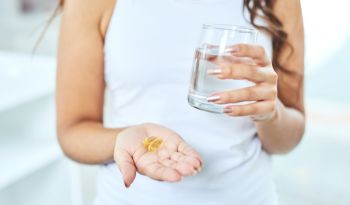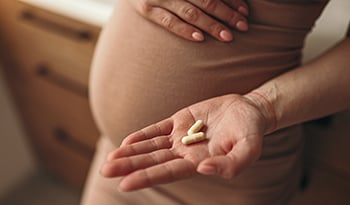Natural Approaches for Postpartum Depression

Postpartum depression is a mood disorder that may interfere with a mother’s ability to care for herself or her child after childbirth. This differs from baby blues, which generally begin within the first two to three days after delivery and may last up to two weeks. When the depression continues beyond this point, it classifies as postpartum depression. The postpartum period is the most vulnerable time for a woman to develop a psychiatric condition, but it is important to remember that symptoms may begin during pregnancy or up to one year after birth.
Signs and Symptoms of Postpartum Depression
Some postpartum depression signs and symptoms include depressed mood, difficulty bonding with baby, withdrawal from friends and family, loss of appetite, inability to sleep or sleeping too much, loss of energy, reduced pleasure in activities one used to enjoy, fear about being a good mother or hopelessness.
In addition to seeing a licensed physician, engaging in psychotherapy and possibly using prescription medications, moms may also choose to make healthy lifestyle choices and use natural remedies as part of their postpartum-depression treatment plan. There are many natural products that are great complementary therapies for mothers coping with postpartum depression.
Available research suggests that aromatherapy may be helpful in treating some of the symptoms associated with postpartum depression. In particular, the scent of lavender may improve sleeping patterns and increase feelings of well-being while minimizing anxiety levels. Massage can be another useful, natural tool that helps combat symptoms of postpartum depression. Taking the time to pamper oneself and distress using this technique is a great way to bolster self-care after childbirth. Massage is often used in conjunction with aromatherapy.
Supplements for Postpartum Depression
Vitamin D and Omega-3s
Additionally, vitamin D supplementation and omega-3 dietary supplements have been shown to have beneficial effects on depression. Some studies have shown that high levels of a particular omega-3 polyunsaturated fatty acid known as docosahexaenoic acid in mothers’ breastmilk is associated with lower rates of postpartum depression. Although the exact role of vitamin D remains unclear in postpartum depression, an association has been established and supplementing vitamin D levels seems protective.
Riboflavin
Riboflavin, or vitamin B-2, may also help decrease the risk of developing postpartum depression. It has been shown to have a positive effect on mood disorder and moderate consumption may lessen symptoms.
Natural Approaches to Postpartum Depression
Bright light therapy is another useful tool that has been studied in antenatal and postpartum depression. Although conclusions in the postpartum population are limited due to small sample size, this treatment may show positive effects for mood given its effectiveness for seasonal and non-seasonal depression. Exposure to the light is recommended for 30–60 minutes once daily.
Exercise is another great way to improve mood and lessen the symptoms of postpartum depression. Moderate physical activity has been shown to increase energy and improve mood. Certain exercise classes encourage you to bring baby along in order to strengthen your bond with baby while fitting a sweat session into your busy schedule as a new mom. Long walks with baby in a stroller or short walks with baby in a carrier are two other ways to fit in some exercise.
References:
- ACOG Committee Opinion No. 343: psychosocial risk factors: perinatal screening and intervention. Obstet Gynecol. 2006; (2):469-77.
- Zuckerman B, Amaro H, Bauchner H, Cabral H. Depressive symptoms during pregnancy: relationship to poor health behaviors. Am J Obstet Gynecol. 1989; 160(5):1107-11.
- Cavanagh HMA, Wilkinson JM. Biological activities of lavender essential oil. Phytother Res. 2002; 16: 301-308.
- Aghajafari F, Letourneau N, Mahinpey N, Cosic N, Giesbrecht G. Vitamin D Deficiency and Antenatal and Postpartum Depression: A Systematic Review. Nutrients. 2018; 12;10(4).
- Yoshihiro M, Satoshi S, Keiko T, Tetsuji Y, Yukihiro O, Wakaba F, Kyoko S, Satoko O, Chikako K, Yoshio H. Dietary folate and vitamins B12, B6, and B2 intake and the risk of postpartum depression in Japan: The Osaka Maternal and Child Health Study. J Affect Disord. 2006; 96(1-2):133-8.
- Oren DA, Wisner KL, Spinelli M, Epperson CN, Peindl KS, Terman JS, Terman M.
- An open trial of morning light therapy for treatment of antepartum depression. Am J Psychiatry. 2002; 159(4):666-9.
- Corral M, Wardrop AA, Zhang H, Grewal AK, Patton S. Morning light therapy for postpartum depression. Arch Womens Ment Health. 2007; 10(5):221-4.
DISCLAIMER:This Wellness Hub does not intend to provide diagnosis...
















































































 Table of Contents
Table of Contents















